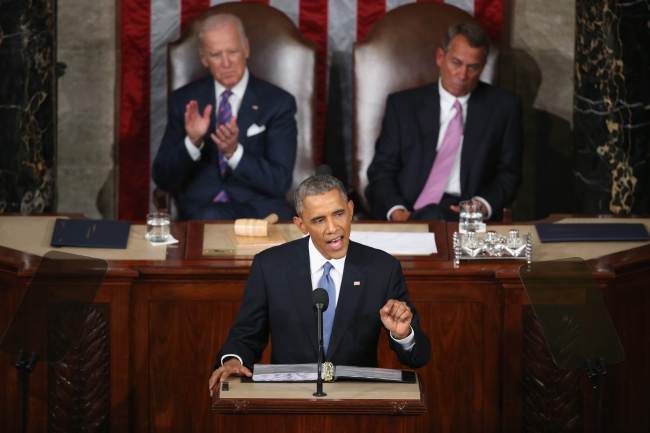[Newsmaker] Obama chooses income equality for next fight
By Korea HeraldPublished : Jan. 21, 2015 - 21:45
WASHINGTON ― U.S. President Barack Obama can claim credit for bringing the economy back from the edge of catastrophe.
But on Tuesday he turned his focus to a glaring failure of the recovery: While the wealthy are now wealthier than ever, the average American has not seen any rebound in his wages since the 2008 crisis.
In his annual State of the Union address, Obama vowed to take on rising income equality, two months after frustrated voters dealt his Democratic Party a resounding defeat in Congressional elections.
Obama called for higher taxes on the very rich, more tax breaks for middle class families, an increase in the minimum wage and better workplace benefits to strengthen household incomes.
But on Tuesday he turned his focus to a glaring failure of the recovery: While the wealthy are now wealthier than ever, the average American has not seen any rebound in his wages since the 2008 crisis.
In his annual State of the Union address, Obama vowed to take on rising income equality, two months after frustrated voters dealt his Democratic Party a resounding defeat in Congressional elections.
Obama called for higher taxes on the very rich, more tax breaks for middle class families, an increase in the minimum wage and better workplace benefits to strengthen household incomes.

Touting a new “middle class economics for the 21st century,” he demanded:
“Will we accept an economy where only a few of us do spectacularly well, or will we commit ourselves to an economy that generates rising incomes and chances for everyone who makes the effort?”
The issue has long been on the boil. The rebound from the 2008 to 2009 recession has put the United States at the forefront of all major economies.
Last year job creation was the strongest since 1999, and the unemployment rate fell to 5.6 percent, enviable within the G20 group of leading economies.
And yet tens of millions of Americans still need soup kitchens and social handouts to survive.
Workers in fast food chains and huge retailers like Walmart are increasingly taking to the streets to protest bottom-level pay that forces them to work two jobs to make ends meet.
In theory, American workers should be able to demand more money. But the reality is that paychecks have barely risen. In constant dollars the average hourly salary today is barely higher than that of 1964.
Meanwhile, the ultra-rich have steadily accumulated wealth. At the end of the 1970s, the top 0.1 percent of Americans controlled seven percent of the country’s wealth. Today they control 22 percent.
The racial divide is equally stark: white families are on average 14 to 15 times wealthier than blacks and Latinos.
“The fruits of the economic recovery unreasonably go to the very rich in the United States,” said economist Justin Wolfers of Peterson Institute for International Economics.
It “is not just the poor getting clobbered; it’s the very rich doing extremely well.”
Economists say that the low jobless rate hides the fact that millions of working age Americans have given up seeking jobs, and won’t return unless they can get higher pay.
Until they do, there will not be the tight supply of workers needed to force wages up.
“Unemployment is definitely lower now, but that’s largely a part of the fact that a lot of people have left the labor force,” said economist Ben Zipperer of the Washington Center for Equitable Growth.
“There’s a tremendous amount of slack. ... We are seeing nothing in the data that wages are going to grow.”
Aside from raising the minimum wage, Obama’s proposals focused on tax changes that will shift benefits from the wealthy to the middle class and poor, and remove loopholes that mean the country’s billionaires often pay a lower tax rate than their clerical staff
“That’s what middle-class economics is ― the idea that this country does best when everyone gets their fair shot, everyone does their fair share, and everyone plays by the same set of rules,” he said.
His proposals pay for themselves fiscally, rather than adding to the deficit, a crucial issue for Republicans.
But Zipperer said this limitation was a “serious weakness”, not increasing the budget to invest in things like roads, bridges and trains that will create more jobs and strengthen the economy.
“There’s a broad need for infrastructure expenditures. We recognize that that’s not something that the private sector is going to provide at the level that we want.
“That’s where you want the state to actually step in and increase those expenditures.”
But it was more than likely that the Republicans, now in control of both houses of Congress, will turn most of Obama’s proposals back.
They have repeatedly rejected any tax increases for the wealthy, and, tapping into a deep American cultural sensitivity, accuse the White House of fomenting class warfare.
“Traditionally, Americans like to think of ourselves as a ‘classless society,’” said Amy Traub of Demos, a liberal research group focused on inequality.
But she said increasingly people are wondering why they have not benefitted in the recovery. (AFP)
-
Articles by Korea Herald








![[Graphic News] More Koreans say they plan long-distance trips this year](http://res.heraldm.com/phpwas/restmb_idxmake.php?idx=644&simg=/content/image/2024/04/17/20240417050828_0.gif&u=)
![[KH Explains] Hyundai's full hybrid edge to pay off amid slow transition to pure EVs](http://res.heraldm.com/phpwas/restmb_idxmake.php?idx=644&simg=/content/image/2024/04/18/20240418050645_0.jpg&u=20240419100350)






![[From the Scene] Monks, Buddhists hail return of remains of Buddhas](http://res.heraldm.com/phpwas/restmb_idxmake.php?idx=652&simg=/content/image/2024/04/19/20240419050617_0.jpg&u=20240419175937)

![[KH Explains] Hyundai's full hybrid edge to pay off amid slow transition to pure EVs](http://res.heraldm.com/phpwas/restmb_idxmake.php?idx=652&simg=/content/image/2024/04/18/20240418050645_0.jpg&u=20240419100350)

![[Today’s K-pop] Illit drops debut single remix](http://res.heraldm.com/phpwas/restmb_idxmake.php?idx=642&simg=/content/image/2024/04/19/20240419050612_0.jpg&u=)